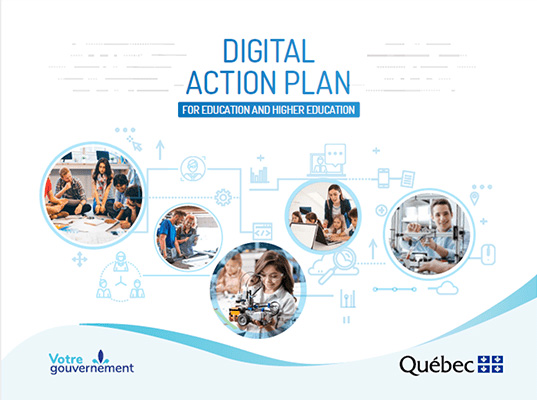Technology-enhanced Flipped Classroom Experimentation: A Pan-Quebec DAP Project
Currently in the Quebec college network there are teachers who are experimenting with flipped classrooms using distance education strategies as a way of provoking deeper learning in students. Over the Fall 2019 semester, Cégep à distance accompanied the Cégep de Chicoutimi, Cégep Limoilou, Cégep Marie-Victorin and Champlain Saint-Lambert through innovative experiments as part of a project funded by the MEES (ministère de l’Éducation et de l’Enseignement supérieur) through the DAP (Digital Action Plan).

The Digital Action Plan for Education and Higher Education provided funding for the 5 partner colleges through a call for projects in 2018-2019. In the 2019-2020 academic year, each college has received a specific budget allocation to fund digital projects.
Project objectives and configuration
The project, which is entitled Promoting student success and perseverance through an education-technology enhanced approach to teaching, uses elements of distance education strategies as well as active flipped classroom approaches (project-based and problem-based approaches) enhanced by technology.
Each college chose at least 3 resource people to participate in the project at the beginning of the Fall 2019 semester. Each local project team includes a project coordinator (generally a Pedagogical counsellor) and 2 teachers. An interesting cross-section of teachers from the Day Division and Continuing Education were chosen for the project. Numerous disciplines are represented in the project, such as:
- Accounting
- Biomedical laboratory technology
- Chemistry
- Information technology
- Nursing
- Sociology
The teachers that were selected had varying levels of experience with using technology in the classroom, and all of them were new to a flipped classroom approach. Each of them shared an interest in innovating in the classroom as a way to increase student success!
The project team members are combining in-person and distance education approaches in a format that is bolstered by different technologies. By assigning theoretical material in self-contained distance education capsules prior to class and then spending in-class time on the application of this theory, students are able to understand the relevancy of what they are learning, which can lead to deeper learning and “make the learning stick.”

Students can review some theoretical notions where and when they like to prepare prior to coming to class and applying their learning (courtesy Anete Lūsiņa on Unsplash)
Project deliverables
The project began with a kickoff meeting to explain each of the deliverables that the project partners would be required to produce. To get things rolling, Cégep à distance provided the project partners with a curated collection of literature in a tool called Sutori. This collection revolved around best practices in flipped education and provided some references on technologies that may be of interest for the distance education portions of the class.
Over the course of the project, Cégep à distance has provided support through regular meetings and correspondence with local project coordinators, created project documentation and templates as well as surveys to gauge the satisfaction of students.
In terms of project deliverables, the innovative project first required each teacher working on the project to provide modified lessons plans for the distance learning elements and flipped classroom events. Since a successful experimentation requires careful planning to ensure that the modified sequence of teaching and events are coherent, this step was a key component to mitigating project risks. The project included a total of 8 flipped classroom events at Chicoutimi, Limoilou, Marie-Victorin and Champlain Saint-Lambert.
A second deliverable for the project was the development of 8 on-line DLRs (digital learning resources) with a maximum duration of 2 hours each. These DLRs often took the form of narrated multimedia videos and animations. Since students view these DLRs prior to class, it was possible for each of the teachers to free up some class time to work with students on applied learning (whether through a problem-solving activity or in-class project).
The final deliverable for the project is a best practices guide which will include case studies that speak to the learning issues addressed by each teacher, the approach that they adopted and recommendations for other teachers wishing to implement this approach. The best practices guide will include the modified course plans used by each of the teachers during the project.
Sharing results
As part of the project commitments, the 5 colleges that make up this partnership will be sharing their experiences with the college network. The first level of sharing will happen through the project’s blog which is being hosted by through Profweb’s free web space service.
The project partners are currently engaged in creating the best practices guide with case studies that will serve as a starting point to inspire other teachers that are hoping to develop a flipped approach with elements of distance learning. These will serve as raw material for some on-line lunch-and-learn presentations organized by college network partners in the coming months.
The resource people from the 5 project partners are currently in the process of submitting applications to present the results of the experimentation during the annual network conferences which take place in May and June. The REPTICs and IT-REPs are likely get an early preview of this presentation at the Spring 2020 meeting of the REPTICs network.
The project team at Cégep à distance has already received positive feedback from the teachers who completed their flipped classroom events in October and November 2019.
In closing, the project partners would like to thank the Ministère de l’Éducation et Enseignement Supérieur not only for their financial support, but for creating an opportunity for 5 colleges to work together in a concerted fashion to help promote student success!
Presentation of the project Promoting student success and perseverance through an education-technology enhanced approach to teaching (source: Cégep à distance)

